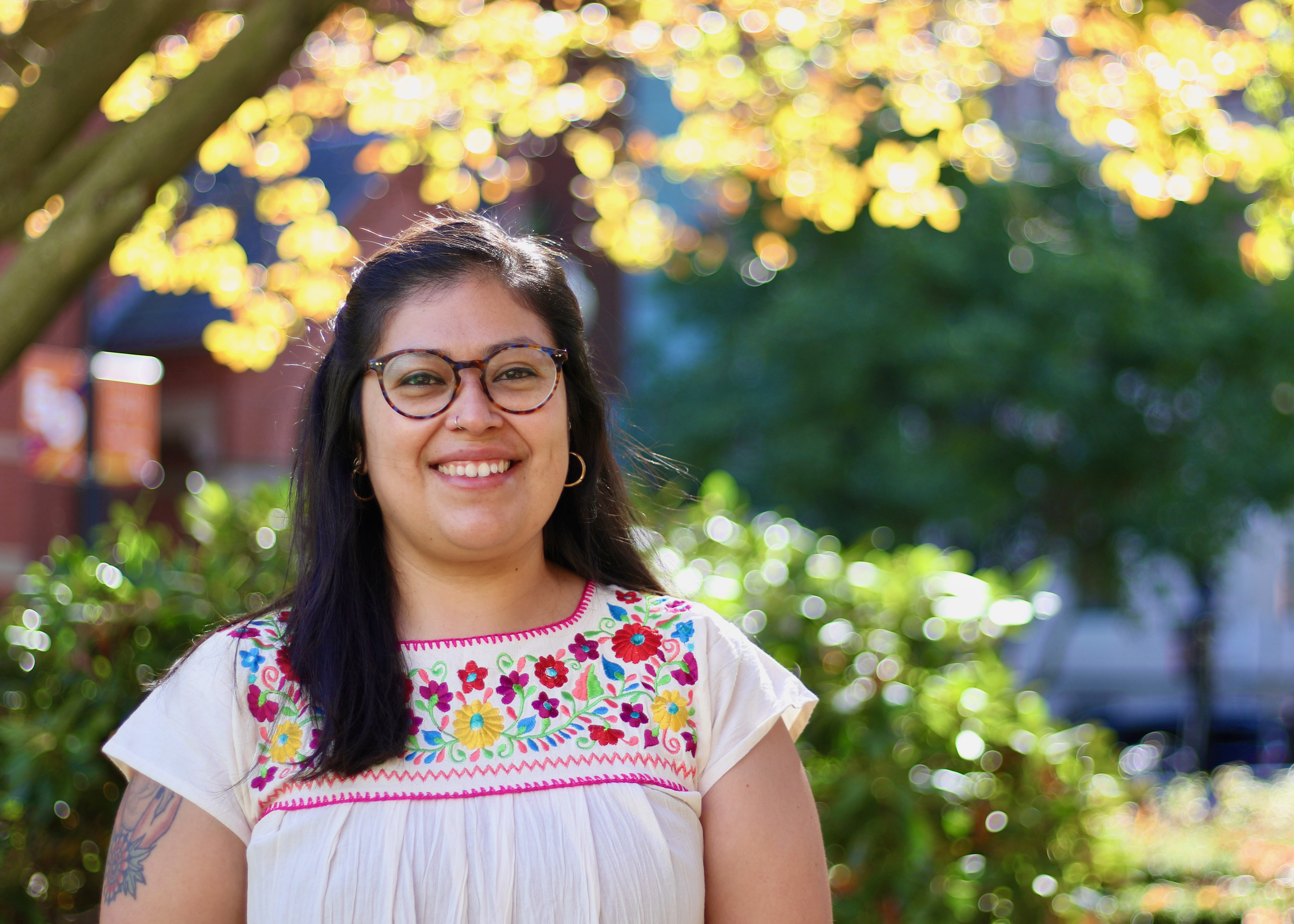PhD Student Named RWJF Health Policy Research Scholar.

Selene Vences poses in front of the Talbot Building on a sunny, fall day. PHOTO: MEGAN JONES
PhD Student Named RWJF Health Policy Research Scholar
Selene Vences, a PhD student in environmental health, has been selected to the ninth cohort of the Robert Wood Johnson Foundation Health Policy Research Scholars Program, a four-year leadership development program providing doctoral students with funding and training to advance health equity.
Selene Vences, a PhD student in environmental health at the School of Public Health, has been named a 2025 Health Policy Research Scholar (HPRS) by the Robert Wood Johnson Foundation, the nation’s largest public health philanthropy.
As a member of the ninth and final cohort of the HPRS program, Vences will join a diverse community of emerging leaders, all developing actionable research questions in their fields. Vences and her peers represent a variety of disciplines, including economics, psychology, transportation, and more. Through a combination of program activities and training in leadership, policy, and research, they will learn to leverage policy as a tool for change, both individually and collaboratively.
“I have a deep appreciation for how policy can transform systems of oppression. I also appreciate evidence-based policy—informed through scientific research and community input aimed at improving health,” says Vences. “I am excited to learn from and collaborate with [scholars from] other disciplines to address current and emerging immigration and environmental health issues that affect people across economic and sociocultural backgrounds.”
The Robert Wood Johnson Foundation envisions a future “where health is no longer a privilege, but a right,” and is renowned for its commitment to tackling the root causes of structural racism and discrimination to advance health equity. Through the HPRS program, RWJF supports full-time doctoral students who bring unique perspectives due to historically marginalized backgrounds, identities, or other lived experiences, and who intend to use their experiences to inform and influence policy. Over the course of the four-year leadership development program, Vences will receive funding and training to apply her research on the intersection of heat and health to advance health equity.
Vences, who was born in Toluca, Mexico, and later moved to Albuquerque, New Mexico, earned her bachelor’s in psychology from the University of New Mexico (UNM), where she developed a passion for research as an El Puente Research Fellow. The fellowship—a program of El Centro de la Raza, the center serving UNM’s Chicano/Mexicano student population—prepares underrepresented, first-generation, or low-income college students for graduate school by guiding them through the process of creating an original research proposal.
Vences also exercised her passion for advocacy as an undergraduate, serving as a community organizer for the New Mexico Dream Team, a grassroots network empowering multigenerational, undocumented, and mixed-status families across the state. At one point, Vences traveled to Washington, D.C. to speak with her state representative about the DREAM Act, the proposed legislation that would provide a path to citizenship for undocumented immigrants brought to the U.S. as children.
“I envision a world where undocumented and immigrant families like mine can access healthcare and attend to medical needs without fear of deportation or having to reveal their immigration status,” says Vences. “Health policymaking is central to this vision because it goes beyond shaping new policies but also seeks to correct historical injustices that have allowed systemic racism to create barriers to healthcare, green spaces, and community investment. Through health policy, we can identify, investigate, and correct healthcare delivery systems that prevent communities from flourishing.”
Vences completed an MPH in epidemiology and biostatistics at SPH in 2023, while working as a research manager in the Department of Environmental Health on The NINOS Cohort, a study of children’s kidney health in Nicaragua. Since beginning her PhD at the school in August 2024, she has worked on several projects related to heat and health. She continues to study chronic kidney disease of unknown etiology (CKDu) in Central America under Jessica Liebler, her advisor and an associate professor of environmental health, and she has also collaborated with Patricia Fabian, her co-advisor and an associate professor of environmental health, on the Community Adaptation to Extreme Heat (CATCH) study, helping to develop a heat policy database of information on how policies across three major US cities—Boston, New Orleans, and Phoenix—affect people’s exposures to extreme heat. Vences’ personal research interests, as she begins to explore possible dissertation topics, include investigating the environmental mechanisms and community-level drivers of CKDu, the health effects of the built environment and of occupational exposures throughout the life course, and the use of mixed methodologies to generate targeted interventions and implement health policy change.
Vences is the first SPH student to join the HPRS program, raising Boston University’s total participants to three, including Michael A. Rosario, a PhD student in neuroscience and a current HPRS scholar, and Daniel Do, a PhD student of social work and an HPRS alum.
“I want to be on the public health front lines, advocating to improve the health of all,” says Vences. “I’m hoping that after this program I’ll have the tools to do that.”
